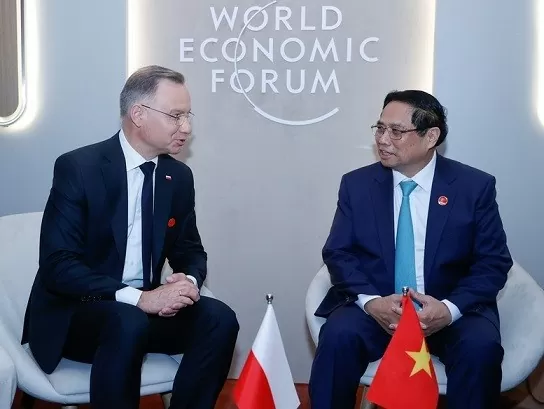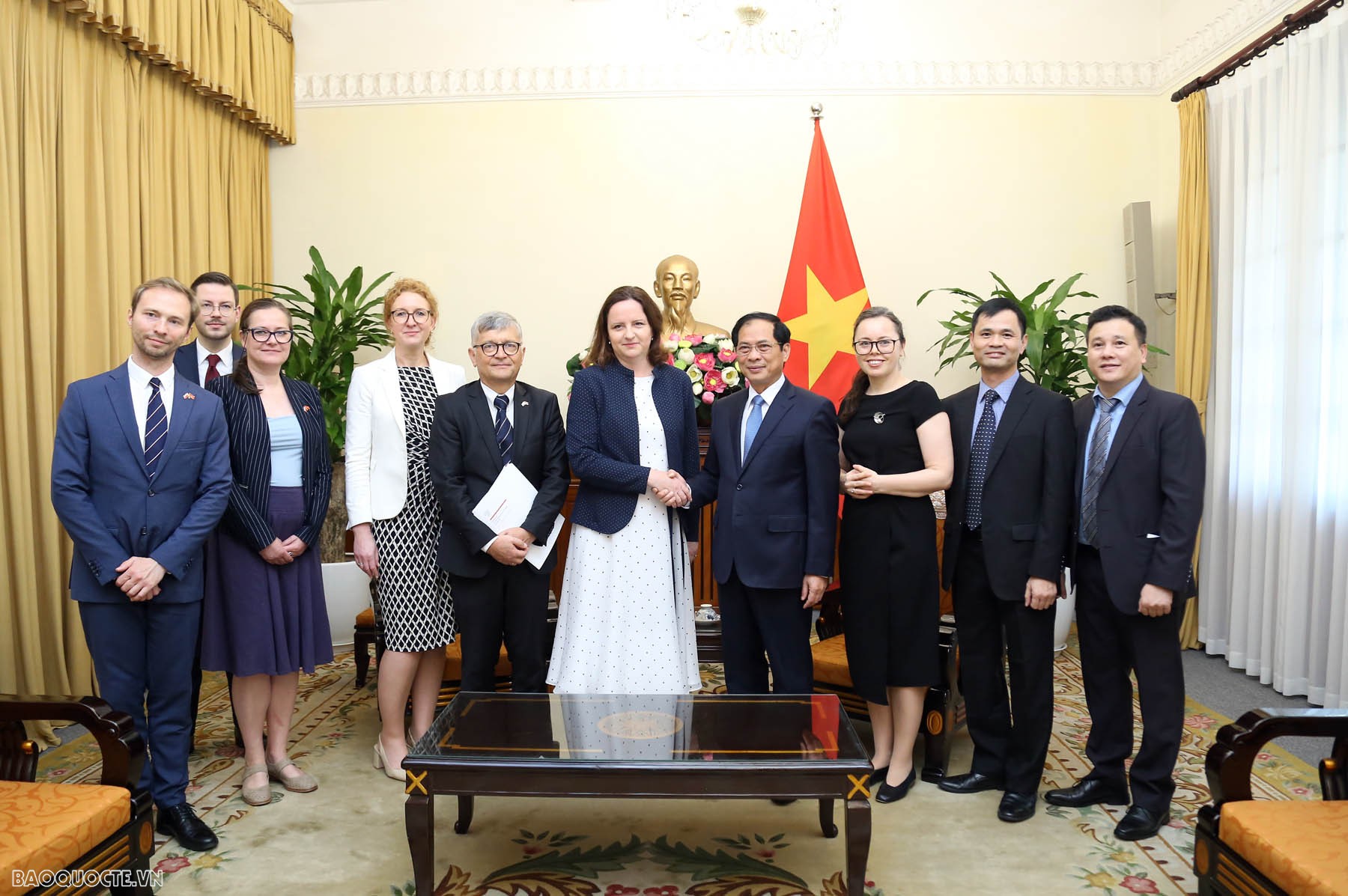
PM Pham Minh Chinh's visit to Poland: 'Unlocking' economic cooperation, 'naming' specific actions and projects
Latest
 |
| Prime Minister Pham Minh Chinh meets with Polish President Andrzej Duda on the sidelines of the Dalian WEF in June 2024. (Photo: VGP) |
Could you please share us your expectations of the visit to our relations?
I find it significant that the Prime Minister Pham Minh Chinh is visiting Poland on the eve of the 75th anniversary of establishing the diplomatic relations between Poland and Vietnam in February 1950. It is important to underline that it will be the first Prime Minister’s visit in 17 years. Poland and Vietnam are important partners, with a long history of friendship, understanding and reciprocal support. We need to work together on a daily basis to fill this partnership with concrete actions and projects. Besides political importance, this visit has a strong economic angle with a huge potential to boost business contacts.
The visit will present the opportunity for a stock taking of bilateral relations and for identifications of areas of mutual interest, where we can develop our relations. The Prime Minister will be accompanied by numerous ministers and vice-ministers as well as huge business delegation. This creates the space for direct contacts resulting in the increase of the interest and understanding of each other, trade turnover, scientific and academic exchanges.
Mutual understanding is the key for successful cooperation. It is also fundamental in the context of international security. We may sometimes have different perspectives, but what unites us is the respect for international law, for the UN Charter and sovereignty on the land and on the sea. Countries like ours, who in the past suffered from more powerful and more aggressive neighbours, understand very well, that principles of the international law and effective multilateralism are the keys for peace, security and prosperity of the nations. The visit will be the opportunity to demonstrate our common position in this respect.
Over the past 75 years, what are the most prominent highlights of the Vietnam-Poland relationship?
Our biggest asset in bilateral relations are the people. We have a long tradition of academic exchange. Especially in the 70’s and 80’s thousands of Vietnamese students went to Poland and graduated from Polish universities, becoming later important members of the Government, army and industry.
It is always a touching experience for me to meet with the members of the Vietnam-Poland Friendship Association, who keep Poland in their hearts, pay a great deal of interest to our country, who still can speak Polish.
Nowadays Poland has a diversified offer for international students so I hope to see more young Vietnamese coming to my country. We need more Polish language speakers in Vietnam as well as more Vietnamese speaking Poles. We need people who understand the culture and histories of our countries.
We need this beautiful story to be continued.
Another important element of bilateral relations lies in political history. Poland has been active in both international control and supervision commissions after the 1954 Geneva accords and 1973 Paris Peace agreement respectively. It created strong bonds between our countries and inalienably located Vietnam on the map of countries important to Poland. Between 1954 and 1956 Polish ship “Kiliński” helped to transport over 80 thousands people, along with equipment and cargo from the South to the North of Vietnam.
Reflecting on the highlights of our relations I need to recall the cooperation on cultural heritage, archelogy and conservation which is personified in Kazik Kwiatkowski, Polish archaeologist and conservationist who between 1980-1997 helped to rescue, protect and promote the most significant Vietnamese treasures, such as imperial capital – Hue, old city of Hoi An, and Hindu temples in My Son.
More recently, during the tough times of Covid-19 pandemic, answering the call from Vietnam, Poland offered 1,4 million vaccines, as well as PPE and medical equipment.
Last but not least, Poland became home to a large, dynamic and entrepreneurial Vietnamese diaspora counted in dozens of thousands. Polish Vietnamese are well integrated in our society, they are teachers, doctors, businesspeople and restaurateurs. Vietnamese restaurants and bars are among the most popular in Warsaw and other cities. Authentic, flavourful and tasty cuisine attracts a lot of people to get to know Vietnam better.
 |
| Minister of Foreign Affairs Bui Thanh Son meets with Polish Deputy Minister Anna Krystyna Radwan-Röhrenschef in May 2024. |
Could you please share us your assessments of the potentials for cooperation between the two countries in emerging areas such as digital economy and green economy?
Our countries share the experience of rapid, uninterrupted economic growth in the past years – in Polish case it’s more than 30 years now since our systemic economic and social reforms that enabled the development of market economy. We share certain development challenges, such as energy transition or need for digitalization. The visit of the Prime Minister, and especially its business component built around economic consultation on a high level, will offer vast opportunities for B2B talks, presentation of different sectors, study visits at the companies.
Poland can present its successes in digitalization of public services, such as e-health or “mobile citizen”. Dynamic development of digital services was precipitated during Covid pandemic, enabling Polish patients to get medical consultations and prescriptions on line, without leaving home. Polish solutions in this area have been awarded United Nations Public Service Award in 2022 and are easily transferable to the interested parties. We are also ready to discuss our achievements in green transformation, including recycling, reduction of emissions, water treatment, renewable energy etc. So my expectation would be to see many of B2B meetings turning into business negotiations and signed contracts in the months to come.
As a country of economic success, the 6th largest economy of the European Union, the 21st economy globally, Poland is ready to share its experience, lessons learned, know-how with our Vietnamese partners. We can also learn from you, it is a two-way street.
What are your expectations for the exchange of business delegations between the two countries in 2025?
I am very glad to see intense cooperation in many areas – only in the past two months I had the honour to welcome in Vietnam the vice-minister of agriculture, vice-minister of foreign affairs, chief veterinary inspector, high level representatives of the defence ministry and defence industry, and the same applies to Vietnamese government officials and business people going to Poland.
Vietnam is an interesting, promising market and so is Poland. Our businesspeople are dynamic, have entrepreneurial spirit, are flexible, always looking for new opportunities. Despite the geographical distance I often see a lot of similarities between our nations. I believe that the year of 75th anniversary, inaugurated by the PM’s visit, will be a good one for business. I mentioned before a number of prospective areas of cooperation: digitalization, green economy, agriculture, food production and procession, defence and military trade.
There is also mining technology and equipment – traditionally a strong area of bilateral economic relations. I see potential in geological cooperation, it has started already and represents a significant potential of growth. Tourism may be the next rising star in our economic relations, as of the November 2024 over 43 thousands of Polish tourists visited Vietnam in 2024. This trend may be further improved with visa facilitation that we hope for, as well as development of direct flight connections.
I hope to welcome representative of those and other branches from Poland to Vietnam and going to Poland from Vietnam. The systematic and strong growth of the GDP contributes to the creation of the middle class and increase of consumption. Thus I believe that we need to benefit from this potential and boost our economic relations in the nearest future.











